Puppy Shots
What vaccinations does your puppy need and when? They can be confusing to keep track of, but getting the right shots at the right time is vital to your puppy’s health.

What diseases are prevented by vaccines?
For the most part, vaccines are used to prevent your puppy from becoming infected with a virus.
Distemper is an airborne virus that infects the lungs, intestines, and brain. The virus is a relative of the bug that causes measles in humans. In dogs, however, it can be fatal. A dog with distemper will develop a high fever, red eyes, and a runny nose. The pads of the dog’s feet may become hard and thick. As the disease progresses, the dog will become more and more tired and lose interest in eating. A persistent cough will develop, along with vomiting and diarrhea. As the virus begins to infect the brain, seizures and paralysis set in. Death results in two to five weeks after infection. There is no cure.
Infectious hepatitis affects the liver, just as it does in humans. It can be as a result of an infection by fungus, bacteria, virus, or parasites. As the liver begins to fill up with inflammatory cells, the normal function of the liver (filtering toxins from the blood) is compromised. The dog will become sluggish and you will notice weight loss. The gums will become yellow due to the build-up of toxins in the blood. Fluid will begin to build up in the abdomen. The dog may develop seizures due to the high level of ammonia that builds up in the body and brain. In mild cases, the dog will recover in a few days. In more severe cases, death can occur within a few hours after the onset of symptoms.
Leptospirosis is unusual in that it is a bacterial infection. It infects a dog when scraped or bitten skin comes into contact with infected urine and then affects the urinary tract of the dog. The bacteria spread from the skin wound through the bloodstream, causing fever and joint pain for up to a week before the bugs settle in the kidneys, eventually causing kidney failure. The dog will be excessively thirsty, but will not be able to produce much urine. Leptospirosis infections are most commonly acquired between July and December, and typically involve large breeds in rural environments. In some areas of the country, this vaccine is considered optional.
Parainfluenza is an infection that sets up in the bronchial tubes of the lungs. It is one of the major causes of kennel cough. The disease is uncomfortable for your dog, but is rarely life-threatening.
Parvovirus is a virus that affects the intestines. It is the most frequent culprit when puppies die from viral causes. The lining of the intestines is stripped away by the virus, causing vomiting, bloody diarrhea, fever, and an infection that eventually overwhelms the puppy’s young system. The parvovirus can live at room temperature for up to six months, so your dog doesn’t even have to come into contact with an infected dog to become ill.
Rabies, perhaps the best known of the viruses infecting animals, can be fatal to both dogs and humans. If your dog is unvaccinated and comes into contact with rabies, for the first two – three days you might not notice any symptoms, other than licking at the site where they were bitten by the rabid animal. They may become irritable or they may become less aggressive than normal. After a couple of days, the dog will become restless, irritable, and vicious. After about a week of this behavior, the virus reaches the brain, causing the dog to become disoriented, then have seizures, then die.

Coronavirus causes intestinal problems. Although the coronavirus itself isn’t particularly awful, young puppies and dogs who have other health problems may develop severe problems from a coronavirus infection. A dog infected with coronavirus will lose his or her appetite, then begin passing very foul yellow / orange diarrhea that may contain blood. The stool will be very soft and watery. Fever is uncommon. In some areas of the country, this vaccine is considered optional.
Bordetella is another bacterial problem, this one affecting the upper respiratory system, and is another common cause of kennel cough. The disease is usually passed among dogs in close quarters, such as a boarding kennel. The infection causes a dry, hacking cough that may sound like the dog is honking. There may be some discharge from the dog’s nose. In severe cases, the dog may develop pneumonia, and in rare cases may die from bordetella infections. In some areas of the country this vaccine is considered optional.
When should my dog get vaccinations?
A newborn puppy gets much of its immunity from his mother via breast milk. However, this immunity begins to wear off within a few weeks. That’s when vaccines take over this protective duty.
At six to eight weeks, it’s time for your puppy’s first shots. These are often given by the breeder before the puppies are sent to their adoptive homes. The shot that is generically known as a “puppy shot” is actually a combination of protective sera for distemper, hepatitis, leptospirosis, parainfluenza, and parvovirus. It is called the DHLPP for short.
The DHLPP puppy shot is repeated at 11 – 12 weeks and again at 15 – 16 weeks. At the same time each DHLPP shot is given, a dose of Coronavaccine is also given if your vet includes it as part of his or her protocol.
Soon after your dog reaches the age of four months, he or she will be given a rabies shot. This shot will then be given as a booster one year later, then every three years thereafter.
Adult Dog Vaccines
During your annual vet visit, your dog will likely receive two booster vaccines: the DHLPP and bordetella.
In some cases, the parainfluenza vaccine is given twice a year for dogs considered at risk because there is some question as to whether protection lasts for a full 12 months. Dogs at risk include those who are in close quarters with lots of other dogs, such as those dogs who participate in shows or who are frequently boarded.
Non-core Vaccines
Depending on where you live, the incidence of certain diseases may be so low that all your puppy will require are the core vaccines of distemper, infectious hepatitis, parvovirus, parainfluenza, and rabies.
The American Animal Hospital Association classifies all other vaccines as “non-core“ or “optional” because they are only given where incidence of certain diseases is high. In addition to leptospirosis, coronavirus, and bordetella as noted above, the other non-core vaccines are given for protection against giardia, bronchiseptica and Lyme disease.
Doggies Den: Latest Articles
 Homemade Thanksgiving Treats for Your Dog
Homemade Thanksgiving Treats for Your Dog
NUTRITION We all want to include our dogs in our holiday celebrations, but hopefully, you're aware that sharing table scraps with your dog isn't always the best idea.
 Keeping Your Dog Safe during the Summer Months
Keeping Your Dog Safe during the Summer Months
HEALTH Summer is coming on fast, so it’s time to plan how you will keep your dog safe and healthy through the lazy, carefree, warm days.
 Vaccination Time Again-Keeping Your Puppy Healthy
Vaccination Time Again-Keeping Your Puppy Healthy
DOG HEALTH So you have your new puppy picked out. There are quite a few shots, treatments and examinations that will keep the newest member of your family healthy.
 Canine Thanksgiving Feast
Canine Thanksgiving Feast
NUTRITION With the wide variety of food at Thanksgiving dinner, chances are you'll want to give your dog something special, too. If you're contemplating what to feed your dog for the holiday, here is a guide to a great Canine Thanksgiving Feast.
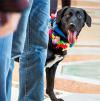 Dog Walking Tips Every Owner Should Know
Dog Walking Tips Every Owner Should Know
DOG FUN Walking your dog is not only crucial to keeping him healthy and happy, it strengthens the bond between your canine friend and his caregiver. There are a lot of obstacles out there. Don’t forget these simple tips to keep your walk fun and safe in the outside world.
 The Benefits of Physiotherapy for your Dog
The Benefits of Physiotherapy for your Dog
HEALTH The same techniques that physiotherapists use to treat a variety of injuries and conditions in humans have been adapted to suit animals with great success. Family pets, show dogs, and working dogs can all benefit greatly from physiotherapy. Dogs whose activities involve a lot of agility are especially susceptible to the types of problems that physiotherapy can address.
 The Decision- Adding a Dog to Your Family
The Decision- Adding a Dog to Your Family
FIRST TIME OWNERSBringing a dog into your family is a decision where many people don’t realize it’s magnitude until after they have the dog. There are a number of things that you need to research before you decide to purchase a dog, and it starts right in your own home.
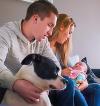 Bringing Your Dog Into Your New Baby's Life
Bringing Your Dog Into Your New Baby's Life
HEALTH Many believe that a dog and a new baby cannot happily coexist, so therefore the dog has to go. This is not necessarily the case.  A new baby does not mean you have to abandon your dog.

Doggies Den:
Most Popular Articles
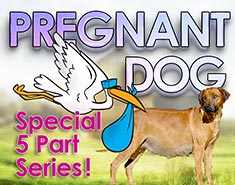
Dog Pregnancy Symptoms
HEALTHIf you suspect your dog might be pregnant, check out part one in this series on pregnant dogs, where we cover pregnant dog symptoms.
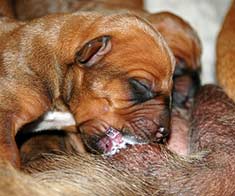
Dog Birth
HEALTHIn the third article of our dog pregnancy series, we look at the wonderful, but messy, process of bringing newborn puppies into the world.

Indoor Dog Potties
DOG PRODUCTSIt's been a long day at work. You were so busy, you didn't even take time to eat a sandwich, let alone run home to let your dog out. You're on your way home, knowing the poor dog is crossing his or her legs by now, when your car breaks down, delaying you even further. Can't somebody make this easier?
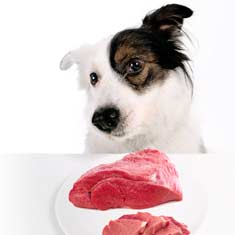
Your Dog’s Digestive System
PHYSIOLOGYEver wonder why your dog eats so fast? Or why he eats gross things? Or why he gets sick to his stomach? Or why his waste stinks so bad? Some of these things are normal, some are not.

Canine Respiratory System
BREATHINGThe basic function of your dog's respiratory system is to bring oxygen in to and remove carbon dioxide from the body. Knowing the symptoms of respiratory diseases can help you help your stay healthy.
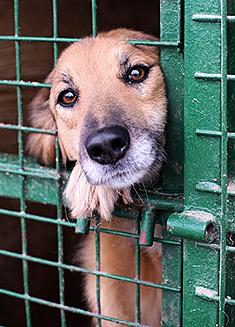
Shelter Dog Adoption Tips for Success
ADOPTION Are you intimidated by the prospect of "rescuing" a dog from a shelter? One reason that you may be wary of adopting a dog from a shelter is not knowing how to choose. Adopting a dog from a shelter can be a rewarding process, if you're prepared to do a reasonable amount of research.
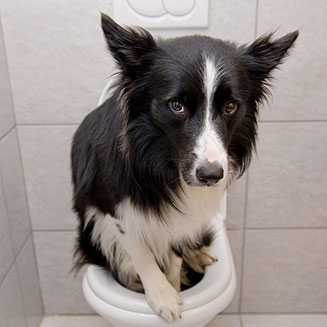
Canine Urinary Tract Infections
SYMPTOMS AND TREATMENTDoes your dog seem to be having trouble relieving his or her bladder? Learn how to recognize the signs of urinary tract infections and how to treat them before they spread.
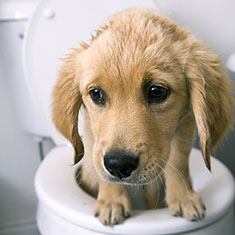
What to do for Dog Diarrhea
SYMPTOMS AND REMEDIESIf you have dogs in your house for any length of time, you have likely experienced at least one bout of dog diarrhea. Beyond the pain in the tuckus involved in cleaning up the mess, you should know what causes diarrhea, and when it's important to see the vet.

What to do for a Dog Bite
DOG BEHAVIOR Getting bitten by a dog can be scary, and you may be tempted to run around in circles for a while, trying to figure out what to do. Here's our guide to help you manage the situation.
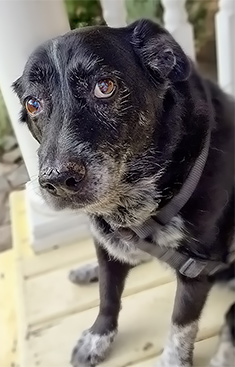
Top Ten Tips for Living with a Senior Dog
DOG HEALTH Bringing home a new puppy is so exciting, but it doesn’t take all that long for your exuberant puppy to grow into a senior dog who may have special needs. Here are the doggies.com top ten tips for taking care of your companion who has been with you through so much.
